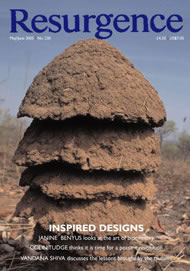THIS SUMMER MILLIONS of us will take to the skies for our annual holiday, to rest and recharge. According to the World Tourism Organization, we're increasingly choosing greener holidays, from organic farm-stay breaks in Donegal to township tourism tours in Port Elizabeth. The market for 'responsible travel' is growing at a healthy 3-5%, and as the travelling public wakes up to greener living, responsible travel seemingly has the whole world at its feet.
Yet paradoxically, in seeking greener holidays in far-flung places, we are jumping more on planes that produce polluting greenhouse gases and contribute to climate change. According to Future Forests, the amount of carbon dioxide an average car emits in an entire year is less than that produced from one return flight to Australia (approximately 3.74 tonnes).
That's one seat on one plane. Even if you only take short-haul flights from the UK to Europe, putting that in a global context is a frightening statistic: the International Air Transport Association recorded 1.8 billion air passenger trips in 2003. The United Nations Intergovernmental Panel on Climate Change (IPCC) says that aviation is the single largest contributor to greenhouse gases (currently about 3.5 per cent), which it says is likely to rise to 15 per cent by the year 2050 if the growth of aviation continues unchecked. Climate change is now as high up on the global agenda as poverty and terrorism, so how can any travel - green or otherwise - that involves flying be called responsible?
According to Justin Francis, managing director of online travel agency responsibletravel.com, "You have to look at the overall picture; not just the flight in isolation, but also what happens as a result of your holiday." Tourism, he says, provides many benefits to destination economies, especially in the non-industrialised countries. Fourteen of the top twenty long-haul destinations are now in these countries, and visitor numbers to many of these countries have doubled, or even tripled, in the last decade. So it's not surprising that tourism has become the main money-earner for a third of non-industrialised countries.
According to Francis, British tourists spend £2 billion a year in non-industrialised countries, "the same amount that the UK Government allocates for its aid budget". While he admits not all of tourists' money reaches local people, a significant amount does, which, he says, is more than what they would get if tourism were abandoned in favour of alternative industries - for instance, mining or logging.
It's not just economic benefits that tourism brings to non-industrialised countries; there are cultural and environmental spin-offs that tourism generates worldwide. The World Wide Fund for Nature's stance on tourism is that the environmental consequences of flying should be considered as part of an overall sustainable strategy that takes into account not only the economic contribution tourism can bring to destinations, but also the social, cultural, and even environmental benefits.
UNESCO's World Heritage List contains 788 'honey-pot' sites, including Australia's Barrier Reef and the Acropolis in Athens, magnets for millions of tourists each year whose money helps contribute to the conservation of these sites of natural and cultural significance. Vast areas of wilderness are now protected as parks or reserves, many of which are largely supported by tourism revenues and would struggle to survive without them. Travel also broadens the mind, provides inspiration to millions of young globetrotters, and plays an invaluable role as a global vehicle for promoting the understanding and appreciation of different cultures.
YET FOR ALL tourism's economic, social and environmental benefits, philanthropic and inclusive, it doesn't sit comfortably with the environmental consequences of climate change, given the enormous potential damage it is predicted to inflict on some of the most fragile places, many of which are the very places we wish to visit on holiday. Many of the low-lying islands in the Maldives could disappear in as little as thirty years' time, and coral reefs are already suffering from coral bleaching. Moreover, climate change is likely to threaten the viability of life in many of the world's most vulnerable and poverty-stricken regions - many of which Westerners are unlikely to visit, as they aren't tourist destinations.
What, then, are we to do? Should we all just stay at home, tucked up in energy-efficient cocoons, and pore over holiday brochures of places that are within walking distance? It is clear that the culture of tourism and long-distance travel is firmly entrenched, so we need to make it more responsible - both ethically and environmentally. (See box of 'Tips for Responsible Travel'.)
There is a growing number of environmental organisations that help travellers offset the carbon that is produced from their holiday flights. Future Forests www.futureforests.com, Friends of Conservation www.foc-uk.com and Climate Care www.climatecare.org provide tools on their websites to work out how much money is needed to support the development of renewable and clean energy projects that can offset the share of the pollution generated from a flight. A return flight to Sydney, for example, would set you back £30; a return flight to Madrid, just £5.
Carbon offsetting at this individual level has credible aims, but it doesn't tackle the root of the problem. According to Dr David Viner at the Climatic Research Unit at the University of East Anglia, the most effective way to tackle aviation's contribution to greenhouse gases is by reducing the use of aviation in general - for example, by implementing an aviation fuel tax. It is likely that a tax will eventually come into legislation, but in the meantime more immediate action is needed, such as carbon trading between airlines, which would at least stem the uncontained increase in emissions.
Viner proposes that we change the way we view flying, seeing it for its true environmental cost rather than as an increasingly cheap and fast way to travel. By balancing out a long-haul holiday with more environmentally sound travel for the rest of the year, or mixing up long-distance trips with holidays closer to home, we could significantly reduce our 'carbon debt'.
Hugh Somerville, ex-head of British Airways' Sustainable Business Unit, says the leading airlines are now addressing the problem of carbon emissions, and the UK aviation industry is trying to join the European Carbon Emissions Scheme by 2008. However, he says the barrier to all of this is the global context, as "there are fears the American carriers might object to such a scheme on the basis of their European operations."
Tourism undoubtedly provides financial and other tangible benefits to holiday destinations, and more responsible tourism makes a significant impact on lessening the ills of tourism's global stampede. However, the contribution of the aviation industry to greenhouse-gas emissions has to be tackled head on if tourism is to stand any chance of gaining credibility as a responsible industry. Aviation fuel tax and carbon trading are unlikely to happen overnight, so the changes that travellers make at the individual level are important in the face of the rapidly growing aviation industry. But unless significant improvements are made to reduce aviation's ecological footprint, the responsible tourism movement will continue to be a worthy yet optimistic patter amid the deafening roar of an increasingly polluting industry, the consequences of which for climate change are becoming all too apparent.
- Read up on the countries you plan to visit and learn even a
few words of the local language
.
- Help the local economy by buying local produce in preference to imported goods.
- Have respect for local cultures, traditions and holy places. Ask permission before you photograph local people, and always dress appropriately.
- Use water sparingly - local people may not have sufficient clean water.
- Use public transport, hire a bike or walk - you'll meet local people and get to know the place better.
- Don't buy products made from endangered species or hard woods, shells from beach traders, or ancient artefacts.
- Think about where your money goes - for example, B&Bs, village houses and locally owned accommodation benefit local families.
- Pack small gifts from home for your hosts.
With thanks to www.responsibletravel.com
Richard Hammond writes a monthly column in The Guardian on eco-friendly holidays.







